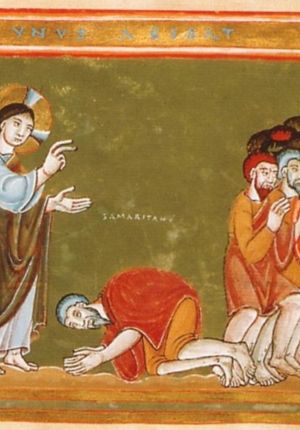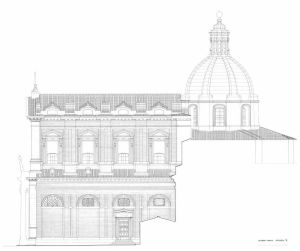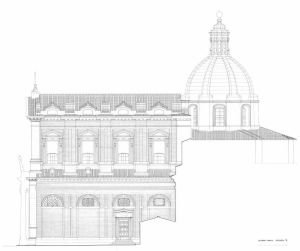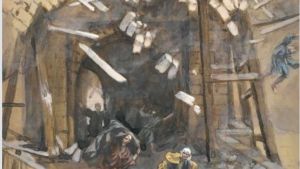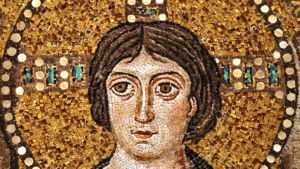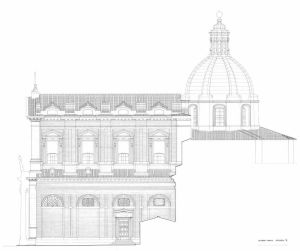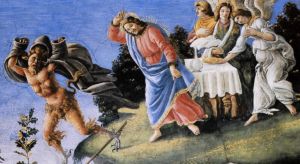
don Giuseppe Nespeca
Giuseppe Nespeca è architetto e sacerdote. Cultore della Sacra scrittura è autore della raccolta "Due Fuochi due Vie - Religione e Fede, Vangeli e Tao"; coautore del libro "Dialogo e Solstizio".
Prayer: Faith-appropriation. Scandal of waiting
28th Sunday in O.T. (year C)
XXVIII Sunday in Ordinary Time (year C) [12 October 2025]
May God bless us and may the Virgin Mary protect us! Reflecting on the gratitude that is easier to see in those who are far away is an invitation to review our personal relationship with God.
First Reading from the Second Book of Kings (5:14-17)
This Sunday's reading begins at the moment when General Naaman, apparently as docile as a lamb, immerses himself in the waters of the Jordan, on the orders of the prophet Elisha; but we are missing the beginning of the story: let me tell it to you. Naaman is a Syrian general highly esteemed by the king of Aram (present-day Damascus). Obviously, for the people of Israel, he is a foreigner and at times even an enemy, and above all, being a pagan, he does not belong to the chosen people. Even more serious: he is a leper, which means that soon everyone will avoid him, and for him it is a real curse. Fortunately for him, his wife has an Israelite slave girl who tells her mistress, 'There is a great prophet in Samaria who could surely heal Naaman'. The mistress tells her husband Naaman, who tells the king of Aram: the prophet of Samaria can heal me. And since Naaman is in great favour, the king writes a letter of introduction to the king of Samaria recommending Naaman, who is afflicted with leprosy, to go to the prophet Elisha. The king of Israel does not know that the prophet Elisha can heal him; on the contrary, he is in a panic because he thinks that the king of Syria is looking for a pretext to wage war on him. Elisha hears about this and asks Naaman to come. Naaman arrives with his entire entourage and luggage full of gifts for the healer. In reality, only a servant opens the door slightly and simply tells him that his master orders him to immerse himself seven times in the Jordan to be purified. Naaman finds this offensive and wonders what is the point of immersing himself in the Jordan when there are rivers in Syria that are much more beautiful than the Jordan. Enraged, he sets off again for Damascus, but fortunately his servants say to him: 'Did you expect the prophet to ask you to do extraordinary things to heal you, and you would have done them? Now he is asking you to do something ordinary, so why can't you do it? Naaman allows himself to be persuaded, and this is where today's reading begins. Naaman obeys a simple order by immersing himself seven times in the Jordan and is healed. It seems simple to us, but for a great general of a foreign army, this obedience is not simple at all! The rest of the text demonstrates this. Naaman is healed and returns to Elisha to tell him two things. The first: 'Now I know that there is no God in all the earth except in Israel', and he adds that when he returns to his country, he will offer sacrifices to him. The author of this passage takes the opportunity to say to the Jews: you have had the protection of the one God for centuries, and now you see that God is also for foreigners, while you continue to be tempted by idolatry. This foreigner, on the other hand, quickly understood where his healing came from. Naaman also tells Elisha that he wants to give him a gift to thank him, but the prophet refuses emphatically: God's gifts cannot be bought. Finally, why does Naaman want to take some soil from Israel with him? He explains that he does not want to offer burnt offerings and sacrifices to other gods, but only to the God of Israel. This shows that, at the time of the prophet Elisha, all the peoples neighbouring Israel believed that the gods reigned over specific territories and, in order to offer sacrifices to the God of Israel, Naaman believed he had to take with him some soil from the land over which this God reigned.
Responsorial Psalm (97/98, 1-4)
In the first reading, Naaman, a Syrian general and therefore a pagan, is healed by the prophet Elisha and, thanks to this, discovers the God of Israel. Naaman is therefore perfectly suited to sing this psalm, which speaks of God's love both for the pagans, whom the Bible calls the nations (or peoples), and for Israel. 'The Lord has made known his salvation, he has revealed his justice in the sight of the nations' (v. 2) and immediately afterwards (v. 3): 'He has remembered his love, his faithfulness to the house of Israel', which is the consecrated expression to remember the election of Israel, the completely privileged relationship that binds this small people to the God of the universe. The simple words "his faithfulness" and "his love" are a reference to the Covenant: it is through these words that, in the desert, God made himself known to the people he chose. The phrase "God of love and faithfulness" indicates that Israel is the chosen people, but the previous phrase reminds us that if Israel has been chosen, it is not to enjoy the privilege selfishly, not to consider itself the only child, but to behave as an older brother, and its role is to proclaim God's love for all people, so as to gradually integrate all humanity into the Covenant. In this psalm, this certainty even marks the composition of the text; if you look more closely, you will notice the inclusion of verses 2 and 3. I would remind you that inclusion is a literary device often found in the Bible. It is a bit like a box in a newspaper or magazine; obviously, the purpose is to highlight the text written inside the box. In the Bible, it works the same way: the central text is highlighted, framed by two identical phrases, one before and one after. Here, the central phrase speaks of Israel, the chosen people, and is framed by two phrases that speak of the nations: the first phrase, 'The Lord has made known his salvation, he has revealed his righteousness in the sight of the nations', and the second concerns Israel: "He has remembered his love, his faithfulness to the house of Israel" and the third: "All the ends of the earth have seen the victory of our God". Here the term "the nations" does not appear but is replaced by the expression "all the ends of the earth". This means that the election of Israel is central, but we must not forget that it must radiate to all humanity. A second emphasis of this psalm is the very marked proclamation of God's kingship. For example, in the Temple of Jerusalem they sing: "Acclaim the Lord, all the earth, acclaim your king." This psalm is a cry of victory, the cry that rises on the battlefield after triumph, the teru'ah in honour of the victor. The victory of God, referred to here, is twofold: first, it is the victory of liberation from Egypt, and second, it is the victory expected at the end of time, God's definitive victory over all the forces of evil. Even then, God was acclaimed as the new king was once acclaimed on the day of his coronation, with cries of victory to the sound of trumpets, horns and the applause of the crowd. But while with the kings of the earth there was always disappointment, this time we know that we will not be disappointed; that is why this time the teru'ah must be particularly vibrant! Christians acclaim God with even greater force, because they have seen the king of the world with their own eyes: since the Incarnation of the Son, they know and affirm, against all apparent evidence to the contrary, that the Kingdom of God, that is, of love, has already begun.
Second Reading from the Second Letter of Saint Paul the Apostle to Timothy (2:8-13)
The hymn "Remember Jesus Christ, risen from the dead; he is our salvation, our eternal glory" is found in its original context in the Second Letter to Timothy, where Paul writes: "Remember Jesus Christ, descendant of David". In the Jewish milieu, it was essential to affirm that Jesus was truly of the lineage of David in order to be recognised as the Messiah. Paul adds: 'He was raised from the dead: this is my Gospel'. The question is radical: either Jesus rose from the dead, or he did not. Paul, initially convinced that it was an invention, had tried to prevent the spread of this proclamation. But after his experience on the road to Damascus, he saw the Risen One and became his witness. Jesus is the conqueror of death and evil, and with him a new world is born, in which believers must participate with their whole lives. For this reason, Paul consecrates himself to proclaiming the Gospel and invites Timothy to do the same, preparing him for opposition and encouraging him to fight the good fight with courage, gentleness and trust in the Spirit he has received. The resurrection is the heart of the Christian faith. While for many Jews the resurrection of the flesh was credible, for the Greeks it was difficult to accept, as shown by the failure of Paul's preaching in Athens. Precisely because of his proclamation of the resurrection, Paul was imprisoned several times: "Christ has been raised from the dead; this is my Gospel. For his sake I suffer, even to the point of being chained like a criminal." Timothy, too, Paul warns, will have to suffer for the Gospel. Paul's chains do not stop the truth: 'I am in chains, but the Word of God is not in chains'. Jesus himself had said that if they remain silent, the stones will cry out, because nothing can stop the truth. Paul adds that he endures everything for the elect, so that they too may obtain the salvation that is in Christ Jesus, with eternal glory. Here the opening hymn echoes and probably follows an ancient baptismal hymn introduced with the formula: "Here is a word worthy of faith: If we died with him, we will live with him; if we persevere, we will reign with him." It is the mystery of Baptism, already explained in Romans 6: with it we are immersed in the death and resurrection of Christ, united with him in an inseparable way. Passion, death and resurrection constitute a single event that inaugurated a new era for humanity. The last sentences highlight the tension between human freedom and God's faithfulness because if we deny him, he too will deny us: God respects our conscious rejection. If we lack faith, he remains faithful, because he cannot deny himself, since God always remains faithful even in the face of our frailty.
From the Gospel according to Luke (17:11-19)
Jesus is on his way to Jerusalem, where his passion, death and resurrection await him. Luke emphasises the itinerary because what he narrates is linked to the mystery of salvation. During the journey, he meets ten lepers who, forced to remain at a distance according to the Law, cry out to him, calling him 'Master': this is a sign both of their weakness and of the trust they place in him. Unlike another episode (Lk 5:12), this time Jesus does not touch them, but only orders them to go and present themselves to the priests, a necessary step for official recognition of their healing. The order is already a promise of salvation. The story recalls the episode of Naaman and the prophet Elisha (2 Kings 5) in the first reading because as the ten set out on their journey, their leprosy disappears: their trust saves them. The disease had united them, but the healing reveals the difference in their hearts: nine Jews go to the priests, only one, a Samaritan, considered a heretic, returns. He recognises that life and healing come from God, glorifies God aloud, prostrates himself at Jesus' feet and gives him thanks: an attitude reserved for God. Thus he recognises the Messiah and understands that the true place to give glory to God is no longer the Temple in Jerusalem, but Jesus himself. His return is conversion, and Jesus proclaims it: "Get up and go; your faith has saved you." Jesus asks the other nine to account for themselves: they met the Messiah but did not recognise him, choosing to run immediately to the Temple to fulfil the Law without stopping to give thanks. The Gospel thus emphasises a recurring theme: salvation is for everyone, but often it is not those closest to God who welcome it: "He came among his own, and his own did not recognise him." Already the Old Testament affirmed the universality of salvation (cf. Ps 97/98). The first reading recalls the conversion of Naaman, a foreigner, and Jesus had rebuked Nazareth, citing the example of the Syrian who was healed while many lepers in Israel were not (Lk 4:27), arousing the anger of the synagogue. In Acts, Luke will again show the contrast between the rejection of part of Israel and the acceptance of the pagans. This question was alive in the early Christian communities: did one have to be Jewish to receive baptism, or could pagans also be accepted? The story of the converted Samaritan recalls three truths: the salvation brought by Christ through his passion, death and resurrection is for everyone; thanksgiving is often best performed by foreigners or heretics; the poor are the most open to encountering God. In conclusion, on the road to Jerusalem, that is, to salvation, Jesus leads all men who are willing to convert, whatever their origin or religion.
+ Giovanni D'Ercole
TRAUMATIC OR PRECARIOUS EXPERIENCES. «DARKNESS»: APATHY, DEPRESSION, PSYCHOSIS, HOSTILITY - (by Francesco Giovannozzi, psychologist and psychotherapist)
A look into the «darkness».
As I have already mentioned, many poets and writers have described the flow of the human soul.
Eugenio Montale expresses this in one of his poems from 1925, on the pain of living, providing us with the image of a stream that cannot flow, a leaf crumpled by excessive heat, a horse exhausted on the ground.
These are images that linger in our minds, leaving us with food for thought and questions to ponder.
There have been moments of 'darkness' in our lives, and perhaps there will be more.
Feelings of discouragement and not knowing which path to take - each of us has experienced this first-hand.
The intensity and duration of the 'darkness' vary depending on the circumstances and our personal ability to react.
We react differently to defeat or disappointment; what upsets one person may leave another completely indifferent.
An encounter with 'darkness' can be common when faced with serious difficulties such as bereavement, loss of employment, the onset of illness, the end of a relationship, and so on.
This state of mind is temporary and ends spontaneously, without bringing about changes in a person's life.
In other cases, it is important not to underestimate this state of mind, as it could be a sign of psychosomatic or psychological distress.
In these cases, we often experience inexplicable feelings of worry and apathy, and we feel more fatigued.
Let us remember that the reaction to 'darkness' often follows a traumatic experience, which in ordinary circumstances would not have caused any temporary feelings of low mood.
A more severe and prolonged reaction, one that the individual cannot overcome on their own, is an unusual condition.
In older people, emotional shocks can trigger moments of 'darkness' more easily than in younger people.
Sometimes older people are marginalised, have fewer social relationships, and often suffer a loss of prestige, especially when they lose hope.
But even adolescents [with their precariousness] are not immune to these moments of unease.
It is not true that adolescence is a happy time of life; on the contrary, it is perhaps one of the most troubled.
In these moments of 'darkness', which clinicians call «depression», we notice that people going through this phase greatly reduce their activities, have less self-confidence, and take an interest in few things.
They are able to keep their jobs even if they have to work harder. Usually, their memory and relationship with reality are not altered - unless a serious condition («psychosis») has arisen.
Arieti describes the depression we have called 'darkness' here as a combination of sadness and pessimism.
The latter is the essential element of the combination; the unhealthy idea is to believe that what has happened to a person will always happen to them, or that their state of mind will never change.
Defeatism, the illusion of knowing what will happen to us in the future, consolidates sadness into 'darkness'.
Often the 'darkness' of the soul is discharged onto the body.
We may experience weight loss, feelings of oppression in the heart, decreased bodily secretions, insomnia, and frequent headaches.
In our behaviour towards others, 'darkness' makes us tend to exploit and influence others; it makes us unwilling to be persuaded. We find it difficult to satisfy others, and hostility often overwhelms us.
Faber Andrew wrote a poem entitled “To those who are going through their darkness”...
The poet invites the reader to «believe in poetry. In the eyes of those who have already found that road».
Then again: «There is a sky here waiting for you, with a breathtaking panorama of dreams».
For a poet, poetry is the main road, but we who are not poets have something to believe in, and that is the pillar of our reality.
Let us always remember that when the night reaches its darkest point, the dawn of a new day begins.
Francesco Giovannozzi, psychologist and psychotherapist.
AGITATION, RESTLESSNESS, WORRIES, FEAR - (by Francesco Giovannozzi, psychologist and psychotherapist)
In today's society, there are many factors that cause anxiety and restlessness, and strategies to combat them are often difficult to find.
This period is characterised by the 'shaking' of fundamental values, norms and aspirations that drove man towards fulfilment and healthy relationships with others.
The current wars around the world, the memories of them for older people, and the threat of nuclear war add to the list.
In such a hostile climate, human isolation is accentuated.
Each person has their own way of reacting: the most common is a sense of unease, anxiety, feeling in danger without knowing what the danger is; a sense of ruin, or something else.
We often fail to understand the cause of all this. People feel helpless, and if this unease is strong, it can be discharged onto the body.
Muscle stiffness may be noticed, or there may be tremors, a feeling of weakness or tiredness; even the voice may tremble.
At the cardiovascular level, palpitations, fainting, increased heart rate and increased blood pressure may occur.
Nausea, vomiting and stomach ache may also occur in the intestines, which have no organic origin.
There may also be other symptoms typical of each person's history, and there is no organ that cannot be affected by internal tension.
I remember that in my professional life I have met people with psychological problems that were 'discharged' in different parts of the body, sometimes in the most unimaginable places.
I have encountered alopecia (hair loss), locked limbs, visual disturbances, fainting, and more recently, teenagers who cut themselves...
If a person feels overwhelmed by a sudden wave of inner discomfort, they may react inappropriately or even dangerously (alcohol, drugs, speeding, gambling, etc.).
Understanding these disturbances, worries and anxieties is important in determining whether they are normal or not.
Unusual states of anxiety are distinguished from more or less persistent apprehension with acute crises.
These states are to be distinguished from the state of generalised worry that we find common in our daily lives.
Let us remember that in order to define our anxiety and agitation, we must convince ourselves that it is something normal when the individual feels threatened.
Agitation should be distinguished from fear, where the danger is real: the individual can assess the situation and choose whether to face it or flee.
When we talk about agitation in the normal sense, we mean that it is human nature to feel it when faced with danger, illness, etc.
It represents the deepest way of living our human existence.
It makes us face our limits and weaknesses, which are not manifestations of inner discomfort or illness, but expressions of human nature.
The more aware we are of our limits, the better we are able to live with our anxieties.
For our fellow human beings who feel omnipotent, agitation and anxiety are unbearable, as they bring to consciousness the limits that are a wound to their 'feeling of being a superior creature'.
We experience normal unease even when we leave an 'old road for a new one'.
From this point of view, it accompanies us in our changes, in our evolution, and in finding meaning in our lives.
Dr Francesco Giovannozzi, psychologist and psychotherapist
Conversion and Times: Faith of the fourth year
Against the tide Transfiguration: Faith and Metamorphosis
RELIGIOUS SENSE AND PSYCHE (by Francesco Giovannozzi, psychologist and psychotherapist)
Reflections on the religious sense.
This reflection also stems from a dialogue with a gentleman of about my age.
This well known and respected gentleman in his village met an old acquaintance of his and was rebuked by the latter because he did not attend religious services; according to her, he should have done so for his own good. The gentleman replied that he did not feel this need and that it did not seem to him that his behaviour might offend the generally understood religious sense.
Discussions like this occur often among human beings, this is nothing new. I report it because it made me reflect on the religious sense in human life. The topic touches on several disciplines and is complex.
Studies by Fiorenzo Facchini say that various behaviours of prehistoric man are read in a religious sense. Our ancestors gave burials to their dead and painted representations on the walls.
These caves had something sacred about them. Religious manifestations of antiquity were songs and dances.
In all religions we find a need for reassurance about our lives and also the need to find magical answers to our problems.
Bettelheim argues that on an individual level and especially in childhood, religion can provide that basis of stability and security with which the child can evolve towards autonomy.
The society in which we live forces us to run, to be in step with the times; it wants to give us its values.
Today there is the fashion of the ephemeral, of competitiveness - and so it is psychologically reassuring to believe in a 'mother-environment' that loves us, or to be within a design that gives meaning to our lives.
Unlike Freud who did not have a positive view, or the philosopher Charles Marx who claimed that religion is the opium of the people, Jung in the eleventh volume "Psychology and Religion" says verbatim:
"Since' religion is indisputably one of the first and universal expressions of the human soul [...] it is not only a sociological or historical phenomenon, but an important personal matter" (vol.XI, p.15).
In my long professional practice I have often encountered people who have had to come to terms with this issue.
The therapist's task is not to condition the other, but to clarify the underlying dynamics.
I have met people who described themselves as non-believers but who on an unconscious level had to come to terms with their dreams. Or individuals who belonged to different religions that were so rigid that they inhibited their vital sense.
In all these cases, knowledge of the human soul grew, whether they claimed to be religious or not. We are not discussing each person's philosophical position.
There were differences between the person who called himself religious and one who was not.
I would like to point out that these differences do not constitute value judgements, but only behavioural characteristics.
The religious person believes that there is a reality that is sacred and beyond this world - and that his existence is enhanced according to his belief.
He who called himself a non-believer rejected transcendence, was one who is self-made and believes that he alone constructs his own destiny.
A constant concern was to deny any reference or wisecrack that was made to religious topics.
I have even met someone who was more concerned about what my beliefs were than his personal problems. I always replied that my sphere of action was the psyche in all its manifestations. Beyond any manifestation sacred or not, respect for the person is already a sacred attitude.
"To 'desacralise' oneself completely is not easy either, as it is difficult to deny history altogether - both for those who believe in creation and those who believe in evolution.
Who knows whether evolution includes a creation?
Dr Francesco Giovannozzi Psychologist-psychotherapist
All Jesus, and the Temptations… trials for Life
Blind, guide of the Blind. Beam and Straw. Tree and Fruit
Loving enemies and turning the other cheek: whyever?
Familiarity at the human level makes it difficult to go beyond this in order to be open to the divine dimension. That this son of a carpenter was the Son of God was hard for them to believe. Jesus actually takes as an example the experience of the prophets of Israel, who in their own homeland were an object of contempt, and identifies himself with them (Pope Benedict)
La familiarità sul piano umano rende difficile andare al di là e aprirsi alla dimensione divina. Che questo Figlio di un falegname sia Figlio di Dio è difficile crederlo per loro. Gesù stesso porta come esempio l’esperienza dei profeti d’Israele, che proprio nella loro patria erano stati oggetto di disprezzo, e si identifica con essi (Papa Benedetto)
These two episodes — a healing and a resurrection — share one core: faith. The message is clear, and it can be summed up in one question: do we believe that Jesus can heal us and can raise us from the dead? The entire Gospel is written in the light of this faith: Jesus is risen, He has conquered death, and by his victory we too will rise again. This faith, which for the first Christians was sure, can tarnish and become uncertain… (Pope Francis)
These two episodes — a healing and a resurrection — share one core: faith. The message is clear, and it can be summed up in one question: do we believe that Jesus can heal us and can raise us from the dead? The entire Gospel is written in the light of this faith: Jesus is risen, He has conquered death, and by his victory we too will rise again. This faith, which for the first Christians was sure, can tarnish and become uncertain… (Pope Francis)
The ability to be amazed at things around us promotes religious experience and makes the encounter with the Lord more fruitful. On the contrary, the inability to marvel makes us indifferent and widens the gap between the journey of faith and daily life (Pope Francis)
La capacità di stupirsi delle cose che ci circondano favorisce l’esperienza religiosa e rende fecondo l’incontro con il Signore. Al contrario, l’incapacità di stupirci rende indifferenti e allarga le distanze tra il cammino di fede e la vita di ogni giorno (Papa Francesco)
An ancient hermit says: “The Beatitudes are gifts of God and we must say a great ‘thank you’ to him for them and for the rewards that derive from them, namely the Kingdom of God in the century to come and consolation here; the fullness of every good and mercy on God’s part … once we have become images of Christ on earth” (Peter of Damascus) [Pope Benedict]
Afferma un antico eremita: «Le Beatitudini sono doni di Dio, e dobbiamo rendergli grandi grazie per esse e per le ricompense che ne derivano, cioè il Regno dei Cieli nel secolo futuro, la consolazione qui, la pienezza di ogni bene e misericordia da parte di Dio … una volta che si sia divenuti immagine del Cristo sulla terra» (Pietro di Damasco) [Papa Benedetto]
And quite often we too, beaten by the trials of life, have cried out to the Lord: “Why do you remain silent and do nothing for me?”. Especially when it seems we are sinking, because love or the project in which we had laid great hopes disappears (Pope Francis)
E tante volte anche noi, assaliti dalle prove della vita, abbiamo gridato al Signore: “Perché resti in silenzio e non fai nulla per me?”. Soprattutto quando ci sembra di affondare, perché l’amore o il progetto nel quale avevamo riposto grandi speranze svanisce (Papa Francesco)
The Kingdom of God grows here on earth, in the history of humanity, by virtue of an initial sowing, that is, of a foundation, which comes from God, and of a mysterious work of God himself (John Paul II)
duevie.art
don Giuseppe Nespeca
Tel. 333-1329741
Disclaimer
Questo blog non rappresenta una testata giornalistica in quanto viene aggiornato senza alcuna periodicità. Non può pertanto considerarsi un prodotto editoriale ai sensi della legge N°62 del 07/03/2001.
Le immagini sono tratte da internet, ma se il loro uso violasse diritti d'autore, lo si comunichi all'autore del blog che provvederà alla loro pronta rimozione.
L'autore dichiara di non essere responsabile dei commenti lasciati nei post. Eventuali commenti dei lettori, lesivi dell'immagine o dell'onorabilità di persone terze, il cui contenuto fosse ritenuto non idoneo alla pubblicazione verranno insindacabilmente rimossi.



